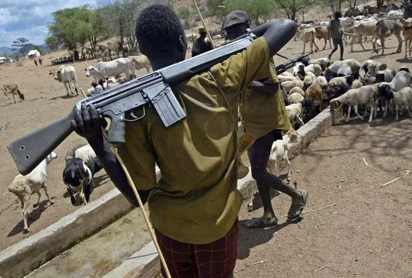Opinion: Deadly Herdsmen Attack
Articles/Opinion, Featured Contributors/Columnists, Latest Headlines Monday, January 22nd, 2018
By Adewale Kupoluyi
(AFRICAN EXAMINER) – A major crisis confronting the nation at the moment is the continued hostilities, wickedness and havoc being wrecked by herdsmen pastoralists in various parts of the country with recent cases being recorded in the middle-belt region. Many people believe that with the poor handling of the menace and the audacity of the herdsmen, they could well be described as a new terrorist group distinct from the dreaded Boko Haram, Al-Shabab and the Islamic State in Iran and Syria (ISIS) and other militant groups. It is instructive that the Global Terrorism Index 2015 had reported that Fulani militants remained the fourth most deadly terrorist group in the world!
Apart from the palpable fear caused victims, the most pathetic part of the calamity befallen our people is the blatant manner in which the unprovoked attacks are carried out on the defenceless, innocent and law-abiding members of communities across the geo-political zones of the country, as children and women are not left out in violence against humanity. People have been made to become refugees in their abode. The incessant attacks in Benue and other parts of the country suggest that the government is not placing adequate premium on the life of Nigerians. What continues to be the crux of the matter is the illegal grazing of farmland, which invariably infringes on the right of farmers to plant and harvest their crops. What do we see? Herdsmen forcefully and indiscriminately allow their cattle to graze cultivated and other peoples’ sweat and farmlands by destroying valuable crops. Any attempt to stop the herdsmen from illegal incursions often result into killing, raping, destroying farmlands as well as sacking whole communities.
Mixed reactions have continued to trail this unfortunate development with myriads of suggestions on the way forward. It is on this premise that, I find as very informative and revealing, two research reports from the Nigerian Working Group on Peace Building and Governance as well as the Chinua Achebe Centre for Leadership and Development on Fulani herdsmen attacks. On one hand, the Nigerian Working Group on Peace Building and Governance, has observed that pastoralists-farmers’ conflicts in the nation had grown, spread and intensified over the past decade. It noted that Nigeria has about 19 million cattle, mostly in the hands of pastoralists. This phenomenal increase of the population has put enormous pressure on land and water resources used by farmers and pastoralists. One of the outcomes of this process has been the blockage of transhumance routes and loss of grazing land to agricultural expansion while the increased southward movement of pastoralists has led to increased conflict with local communities.
Recommendations given by the group include the establishment of grazing reserves, saying that the establishment of such reserves would provide the opportunity to practice more limited form of pastoralism as the nation has a total of 417 grazing reserves out of which only about 113 had been gazette. It regretted that one of the greatest difficulties in addressing and resolving matters surrounding pastoralism was the politicisation of legal regimes and erection of blockages to the enactment or implementation of laws that can redress key challenges. The group maintained that there was an emerging conflict between the constitutional principle on the free movement of persons, goods and laws emerging in some states by restricting movement. In addition, pastoralism is not sustainable in Nigeria over the long term, due to the high population growth rate, expansion of farming and loss of pasture and cattle routes. It further called for digital tracking of cattle that would involve inserting microchips in the animal skin and tracking them with mobile phones.
Similarly, the Chinua Achebe Centre for Leadership and Development also made interesting findings. According to the centre, the herdsmen terrorists are mostly non-Nigerians and mainly migrants from Chad, Niger, and other Fulani enclaves outside the country. They were said to be major actors and catalysts to recent conflicts in the Central African Republic. It noted further that herdsmen terrorists do not own cattle, as most of them are employed by the cattle owners as ‘security men’. The cattle are owned by prominent Fulani leaders in the country while they increase their wealth astronomically through cattle rearing. The herdsmen do not follow the cattle around, but move in separate vehicles along a defined route. The report revealed that instead of investing in ranches and buying of grasses from the south, the herdsmen chose the cheaper alternative of taking the cattle from the north to south seasonally; using the entire Nigerian space as their ‘grass kingdom’. This is rather unacceptable.
Beyond the blueprint reeled out by both groups, I think there are several undercurrents that should be given desired attention. For instance, the Myatti Allah, the umbrella body of herdsmen that had allegedly threatened to unleash mayhem if Benue State enforces the Anti-grazing Law, as passed by the State House of Assembly, should be called to order. To show the severity of the lawlessness that could ensue, Gov. Samuel Ortom had to visit President Muhammadu Buhari in Abuja, to obtain assurances and support for the new law to work! Is this how to practice true federalism? Is the government afraid of Myatti Allah leadership for thorough investigation?
The President recently admitted that poverty, injustice and lack of job opportunities were mainly responsible for inter and intra-communal crises in the country. What concerted efforts are being made to address the high level of unemployment in the land? Another area that the Federal Government should be mindful of is the way and manner of deploying security machinery to tackle threats to peace. Such interventions should not be seen as lopsided, biased and selective. For instance, unlike the approach adopted in dealing with militants in the Niger Delta and Boko Haram in the North-East, not much has been done to curb the excesses of the Fulani herdsmen.
The government should continue to engage the leadership of the herdsmen by making them to realise that open grazing is no longer fashionable around the world, as even countries with large herds of cattle now raise their animals in ranches. The position should be driven home with superior argument that animals deliberately supplied with feeds and other nutrients are healthier and better fattened, as against their itinerant breeds, as found here in Nigeria, where the animals face many risks while looking for what to eat. To be fully convinced of government’s sincerity and sustainability, necessary policies should be put in place to assist farmers in the supply of pasture and other nutritious feeds to cattle. The government would douse the tension in the land by discouraging open grazing and confining all itinerant herdsmen to established ranches. This is in tandem with some of the recommendations made in the 2014 National Conference that is not receiving the deserved attention of government. Traditional and religious leaders should intensify efforts by appealing to their subjects to embrace peace while those apprehended should be severally punished.
Before ending this discourse, another line of thought crossed my mind and I became curious. I was wondering why we are having increased wave of onslaught by herdsmen at this time. Could there be any political undertone in order to discredit the Federal Government? Has it got anything to do with 2019 or not? I remember the Chibok schoolgirls abductions and the credibility crisis of the Jonathan administration. Any semblance? It is only hoped that those fanning the ember of discord and disunity through the deadly herdsmen attacks would be curtailed without further delay. The ongoing senseless killings should stop.
Kupoluyi writes from Federal University of Agriculture, Abeokuta (FUNAAB), adewalekupoluyi@yahoo.co.uk,@AdewaleKupoluyi
Related Posts
Short URL: https://www.africanexaminer.com/?p=42359






















